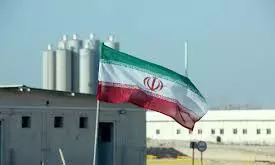
Israel considers limited strike on Iran amid diplomatic tensions and nuclear concerns
text_fieldsDespite ongoing diplomatic negotiations between the United States and Iran, Israel is still weighing the possibility of launching a limited military strike against Iran's nuclear facilities in the coming months, according to Israeli officials and sources familiar with the matter.
While U.S. President Donald Trump has reportedly conveyed to Israeli Prime Minister Benjamin Netanyahu that Washington is currently not willing to support a military strike, Israel continues to explore alternative options that would require minimal U.S. involvement.
The proposed strike plans, which were shared with the Trump administration, involve a combination of airstrikes and special forces operations aimed at temporarily delaying Iran’s nuclear development. Sources indicate that these operations are designed to be more limited in scope compared to earlier proposals, potentially pushing back Iran's nuclear capabilities by several months to a year, reported Reuters.
Netanyahu, a long-standing critic of Iran’s nuclear ambitions, maintains that Tehran must fully dismantle its program. He has argued that any agreement with Iran should resemble the "Libyan model," in which facilities are dismantled under international supervision. Israeli officials have expressed skepticism over ongoing negotiations and warned that diplomatic efforts must come with firm guarantees that Iran will not acquire a nuclear weapon.
A second round of U.S.-Iran nuclear discussions is set to take place in Rome. However, Israel’s concerns remain high. A senior Israeli source emphasised that no final decision has been made on whether or when to proceed with a strike, particularly while talks are ongoing.
While Israel has often depended on U.S. support for such high-risk military operations, the more scaled-down version of a strike currently under consideration may be executed without direct U.S. participation. Still, Israeli officials are seeking assurances that the U.S. would help defend Israel if Iran retaliates.
The Biden administration, too, has reportedly pushed back against earlier versions of the Israeli plan. Former U.S. officials noted that Netanyahu had lobbied for America to lead airstrikes, but the Biden White House remained firm, stating that military action would only be considered if Iran significantly escalated its nuclear activity, such as expelling international inspectors or increasing uranium enrichment.
Military analysts argue that even a well-coordinated strike would only temporarily halt Iran’s nuclear ambitions, especially since some facilities are buried deep underground. A senior Iranian security official responded to the growing speculation by warning that any attack would provoke a “harsh and unwavering” response from Tehran. Iranian intelligence agencies are reportedly already aware of Israel’s planning.
The timing may also play a role in Israel’s strategic calculations. With regional adversaries such as Hamas, Hezbollah, and the Houthis under recent military pressure, and Iranian air defense systems reportedly weakened after clashes in late 2024, Israeli officials may view this as a favorable window for action.





